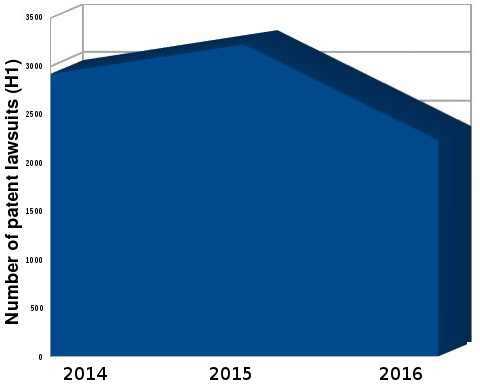

Based on data from Lex Machina
THE USPTO is loved by patent aggressors and feared by everybody else. According to these new figures from Lex Machina (reported by IAM in this case), the USPTO just got a little less scary. To quote one of many analyses to come (after the US holiday): "New patent lawsuit in the US were down by close to 1,000 filings in the first half of 2016 compared with the first six months of 2015, providing a further indication that the marked drop off in cases since December may be part of a longer-term trend.
"As expected, given the IAM funding sources, IAM is not particularly happy about it, but what IAM wants is typically the very opposite of what society as a whole should want.""According to Lex Machina’s running total, there were 2,238 cases brought in the first six months of this year compared with 3,232 in 2015 and 2,923 in 2014. That makes it the lowest first half total since 2011, the year that the America Invents Act was signed into law and its new joinder rules led to a spike in filings. Lex Machina has not officially announced their numbers for the first six months of 2016, but Lex Machina’s database keeps a running total and it’s safe to assume that the final total to the end of June will be close to 2,238. Unified Patents released its analysis earlier today which put the number of new cases at 2,187."
This looks like great progress, possibly attributable to PTAB (part of America Invents Act*) and the message it sent out to patent aggressors after Alice had been handed down from SCOTUS.
As expected, given the IAM funding sources, IAM is not particularly happy about it, but what IAM wants is typically the very opposite of what society as a whole should want. IAM's agenda is still promotion of the EPO, opposition to patent reform, UPC advocacy, and software patents (there's no ambiguity about it). In the US, which still grants some software patents and thus helps patent trolls, voices can be found of large corporations that are upset. IAM gives them a platform this week. It is quite revealing.
Over at Patently-O, a blog based in the US (unlike IAM which is British), a MacDermid v. DuPont petition gets mentioned today and to quote the original: "Whether the Federal Circuit has erred in holding that there “must” be a proven “reasonable expectation of success” in a claimed combination invention in order for it to be held “obvious” under 35 U.S.C. €§ 103(a)."
"It was eventually the Supreme Court -- not US Congress (in the pockets of megacorporations) -- that brought necessary change."Arguments about obviousness of patents have become commonplace not just because of Alice (which mostly relates to business methods and software). Another Patently-O article from today speaks of Rapid Litigation Management v CellzDirect and says that "[o]n appeal, the Federal Circuit held that the claimed hepatocyte prep-method was “not directed to a patent-ineligible concept.”"
To quote the original: "The inventors certainly discovered the cells’ ability to survive multiple freeze-thaw cycles, but that is not where they stopped, nor is it what they patented. Rather, “as the first party with knowledge of” the cells’ ability, they were “in an excellent position to claim applications of that knowledge.” Myriad, 133 S. Ct. at 2120 (quoting Ass’n for Molecular Pathology v. U.S. Patent & Trademark Office, 689 F.3d 1303, 1349 (Fed. Cir. 2012) (Bryson, J., concurring in part and dissenting in part)). That is precisely what they did. They employed their natural discovery to create a new and improved way of preserving hepatocyte cells for later use."
Here we have Myriad (the SCOTUS determination) being used to challenge another kind of patent. It was eventually the Supreme Court -- not US Congress (in the pockets of megacorporations) -- that brought necessary change. ⬆
_____
* A science-led Patent Trial and Appeal Board which invalidates many software patents these days.